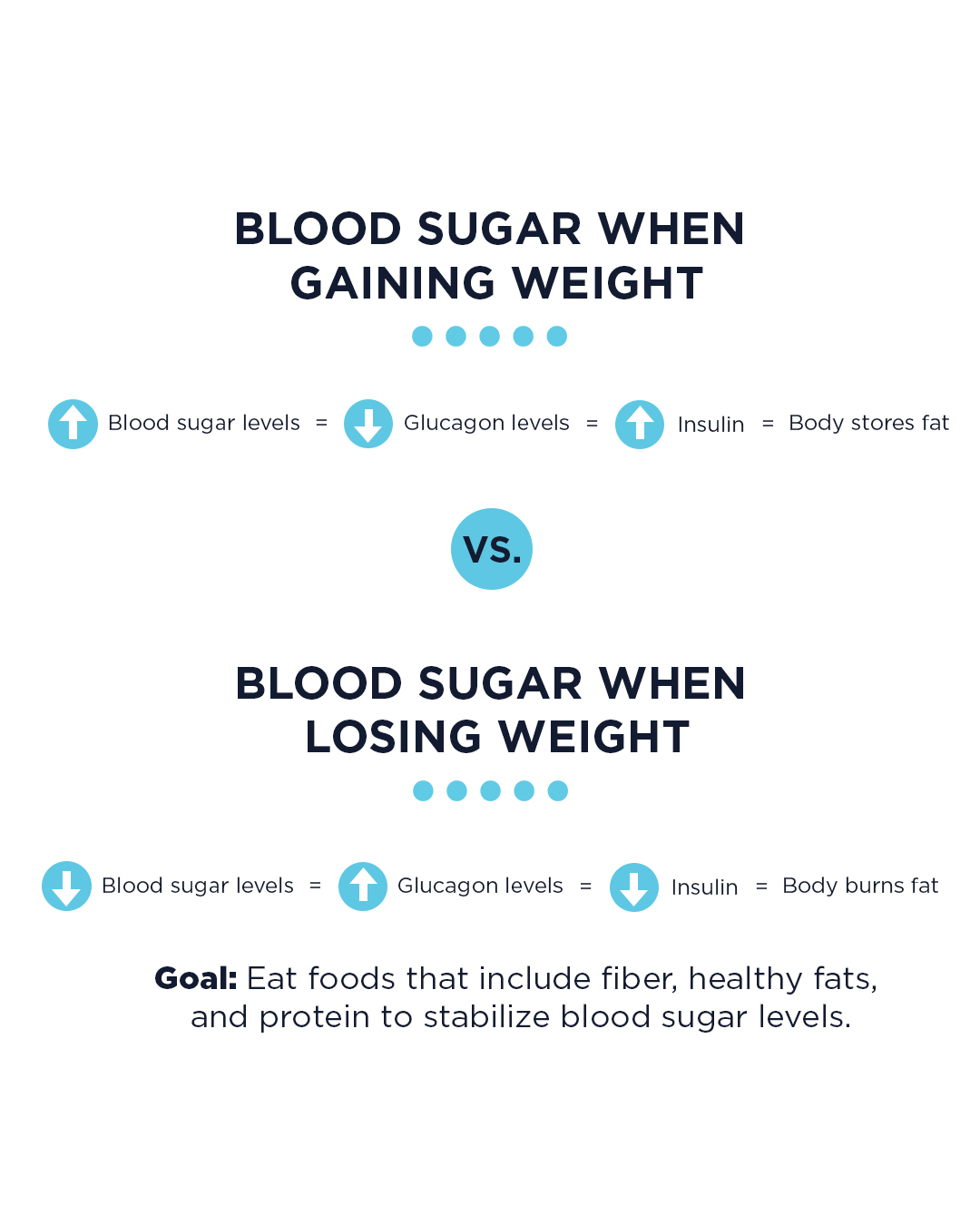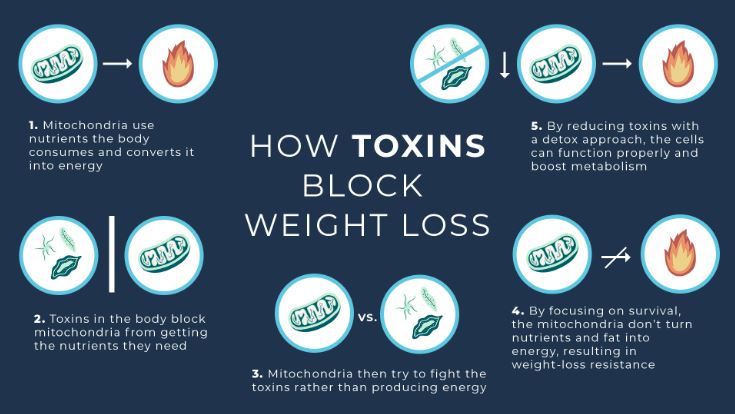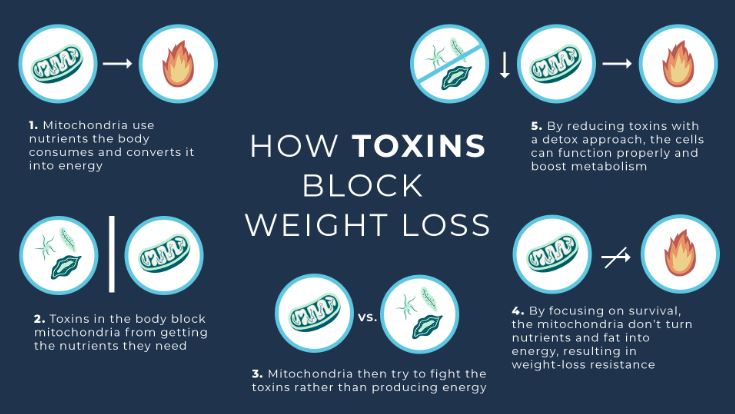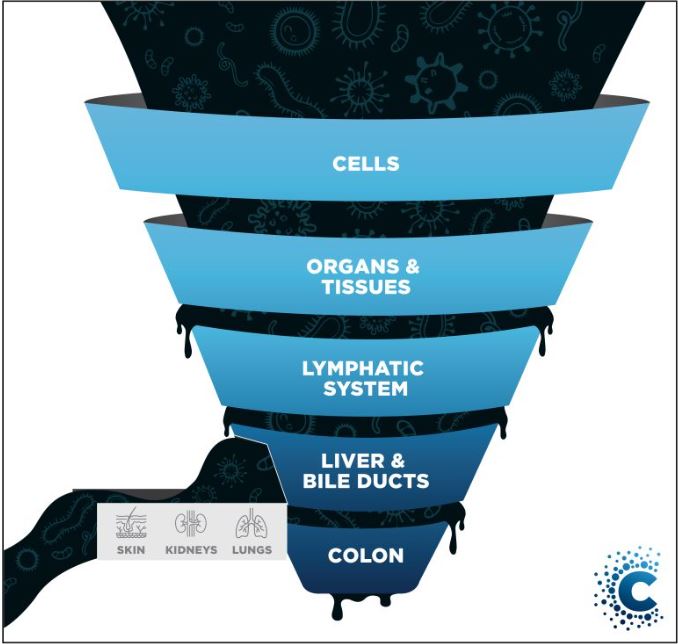Before Beginning a Weight-Loss Journey
Before you start any weight-loss plan, it's important be prepared. Here are some of the first things you'll need before setting off on your weight-loss journey.
Good drainage: To be successful in our weight-loss endeavors, drainage is crucial. Make sure you're familiar with the drainage funnel and how it involves everything from pooping a lot to sweating a lot.
Having good drainage means that things are moving and flowing inside and that your body is balanced. If you're planning to start a protocol, it will help to understand that drainage is the first step toward detoxing, when your body will naturally get rid of fat, toxins, and other things that could stand in the way of fitting into your skinny jeans.
Mental and emotional commitment: Losing weight can be a lengthy and in-depth process, and many people might not be fully ready or know what to expect.
Trying to lose weight can involve major lifestyle changes, such as diet modifications or learning to be more active. And even more emotionally daunting: It may take a while for you to see results, which can be extremely discouraging. First make sure that you are truly committed to losing weight.
Mitochondrial support: Mitochondria and the energy they produce can really affect your weight-loss efforts. You won’t be able to lose weight if your mitochondria aren't helping you to do so. (2, 3)
Mitochondria convert nutrients to energy, which means burning more calories and having more pep for physical activity. So supporting the mitochondria and keeping them functioning at their prime is an important first step toward weight loss. (4, 5)
The Importance of Blood Sugar for Weight Loss

You can control your blood sugar levels via the foods you eat. Your blood can only handle a limited amount of sugar at a time. Anything more than that isn’t readily processed and can begin to cause hormonal problems and inflammation in the body. (6, 7, 8)
When your blood sugar levels get too high, your body secretes insulin, which tells your body to store fat. At the same time, your levels of glucagon will decrease. Because glucagon is the hormone that prompts our bodies to burn fat for energy, we burn more fat if we have higher levels of glucagon. (5, 9, 10)
In a study, rats injected with glucagon gained 75% less weight, produced less fat and protein, and retained less water than rats who didn’t receive glucagon. (5)
Here’s a simple way to break it down:
The more sugar in your blood, the higher the insulin levels and the lower the glucagon levels, and the less fat is burned. So eating foods that support glucagon and suppress insulin can help with weight loss. (11, 12, 13, 14)
Also, when people have too much sugar in their bloodstream, their bodies don’t know what to do with it or how to process it. Sometimes, the liver helps. It responds to the insulin by secreting cholesterol, which is converted to fat. Sugar in the blood that attaches itself to proteins in the bloodstream leads to inflammation. (15, 16, 17, 18, 19)
On the other hand, keeping blood sugar levels under control can even help slow the aging process. (20, 21)
If you are wondering how you can keep your blood sugar levels down, avoid eating processed foods, especially carbohydrates, which are quickly converted to sugar and go directly into the bloodstream. Instead, it is suggested that you look for whole foods that come from farms and not factories — foods that are grown or raised sustainably and not processed. (22, 23, 24, 25)
If possible, every meal that you eat should include some fiber, healthy fats, and protein. This will help avoid spikes in insulin and will stabilize your blood sugar levels.
Toxins and Weight-Loss Resistance
Are you familiar with the laundry list of ailments that toxins in our body can cause? From brain fog to brain damage, hair loss to hormone problems, toxins can interfere with our body’s systems and lead to endless health conditions. This can be toxins that come from glyphosate and other chemicals, heavy metals, mold, parasites, radioactive elements, and more.
But toxins can also stop us from losing weight. If you seem to be doing everything right in your weight-loss efforts, yet those pounds just keep hanging on for dear life, it could be due to toxins. Here’s how that works. (26, 8)
Toxins and the mitochondria
The mitochondria in our cells produce energy that the body needs to perform and to keep us feeling energized. Mitochondria play a big role in weight loss because they suck up the nutrients that we consume and convert them to energy rather than leaving them where they’ll be turned to fat. (27, 9, 28)
But toxins in the body affect the mitochondria directly, keeping them from functioning correctly. They’re not able to get the nutrients they need because the toxins block them. (29, 30, 8, 10)
The mitochondria then go into the equivalent of panic mode and switch over to trying to fight off these toxins instead of producing energy — a process known as the cell danger response (CDR). Both the immune system and mitochondria become preoccupied with merely keeping the body alive and healthy. As a result, you may stop losing weight and develop weight-loss resistance. (31, 8, 9, 10,11, 14, 32)
Weight-loss resistance also occurs when mitochondrial function is compromised, resulting in cortisol abnormalities. Cortisol can cause weight gain, as it’s associated with metabolism and cravings. However, cortisol is not the only hormone associated with toxicity-based weight gain or retention. (33, 34, 35, 36)
Toxins and hormonal imbalances
Toxins such as endocrine-disrupting chemicals (EDCs) can lead to hormonal imbalances, resulting in such conditions as estrogen dominance and thyroid dysfunction. A side effect of both of these is weight gain and/or difficulty losing weight. (37, 38)
The liver plays a big part in this as well, because it metabolizes hormones. If the liver is not detoxing properly, then it’s probably not functioning properly either, and that means that the hormones will be affected. The result will once again be problems losing weight. (39, 40, 41)
Iodine deficiencies can also have an effect on the thyroid with the same weight-related outcomes. This is compounded by the fact that toxins make it more difficult for the body to absorb the iodine it needs for sufficient thyroid function and hormone synthesis. (42, 43, 44)
When our hormones are off-kilter, it’s usually the body’s way of telling us that something is wrong. In this case, that something is toxicity. You need to get rid of the toxins to get your body back to balance and be able to lose the weight. (45, 46, 47)
Mold and mycotoxins are a major concern when it comes to both hormone imbalance and mitochondrial dysfunction. These toxins can also really ruin the gut, which in turn affects the hormones. (48, 49)
To reverse weight-loss resistance and get back on the track toward trimness, the best approach is detox. By doing a detox protocol, you can pull out those toxins that are interfering with their mitochondria and hormones and putting the brakes on your weight loss. This will get your cells and metabolism working properly again. (50)
Emotional toxins
Emotional toxins, or toxic energies, can also affect someone’s ability to lose weight. Things like anger, anxiety, stress, and other emotional issues can affect how well the body functions and can hinder weight loss. (12, 13, 51)
In fact, studies have shown a direct and bidirectional correlation between positive emotions and healthy eating. Research found that people who eat healthy foods exhibit better moods, less depression, and less stress. (12, 13)
Similarly, those who are in a more positive emotional state tend to eat a healthier diet and maintain a healthier body weight. Positive emotions have also been shown to keep blood sugar levels stable, lower blood pressure, and promote overall good health. (12, 13)
One study suggested that young adults exhibited a more positive mindset the day after having consumed fruits and vegetables. On the other hand, overeating and an unhealthy diet led to negative emotions, including stress and pessimism. (12, 13)
In addition, if you are overly discouraged that you're not losing weight, you might give up or develop a mental block. Our perceptions or beliefs about ourselves, our ability to lose weight, and even whether we deserve to achieve our goals can be roadblocks. And if our motivation is lagging and our heart is just not in it, we’re not going to put forth the same amount of effort nor achieve the same results.
It may be that you just need a little encouragement, a new perspective, or a different mindset. Getting rid of negative emotions and keeping a positive outlook may be just the catalyst you need to shift your weight loss into high gear again.

Several Weight-Loss Methods
If you are determined to lose weight — and especially if you've been at it a while without seeing results — you're probably willing to try just about anything. And there are many methods out there, some healthier and more beneficial than others. Whether you suggest one of the tried-and-true techniques or a more alternative weight-loss approach, here’s a list of several to consider: (52, 53, 54, 55, 1, 2, 3)
Acupuncture
Research suggests that acupuncture is an excellent weight-loss tool and may help fight obesity. In multiple studies, subjects who underwent acupuncture treatments showed reductions in body-fat mass, body-mass index, cholesterol levels, triglyceride levels, and weight. (56, 57)
One study found that acupuncture in combination with a low-calorie diet helped not only with weight loss, but also reduced the chronic inflammation that is prevalent in many obese people due to their secretion of inflammatory cytokines. (58)
Acupuncture may also contribute to weight loss by helping to boost energy, control appetite, and improve metabolism. (59)
Certain diets
You might have your own go-to dietary plan or have strong feelings about “diets” in general. But eating a healthy diet for weight loss is obviously part of the bigger picture.
The Mediterranean Diet is probably one of the trendiest eating regimens going these days. It has many benefits and seems to produce a good level of success, not to mention that you have likely heard about it already.
As the name suggests, this diet is based on the traditional eating and lifestyle patterns of those who live near the Mediterranean Sea. In general, the Mediterranean Diet is high in monounsaturated, or omega-9, fats — such as olive oil and nuts and seeds — and low in saturated fats. (18, 60)
Followers of the Mediterranean Diet limit their intake of saturated fats to small amounts of such foods as plain, whole-milk yogurt, which is thought to help prevent heart disease (61, 62, 18).
This diet includes eating the following foods in varying quantities, from incorporating some at every meal to eating them once a week or even more rarely: (18)
- Beans and legumes
- Cheese
- Eggs
- Fish
- Fruits
- Herbs and spices
- Nuts and seeds
- Olive oil
- Plenty of water
- Poultry
- Seafood
- Vegetables
- Whole grains
- Wine
- Yogurt
The people of the Mediterranean region eat almost exclusively locally grown, in-season, fresh and natural foods, which further encourage good health and may make them less susceptible to things like pesticides and other chemicals. As discussed above, toxins can interfere with weight loss. (18)
All of these are likely factors influencing the success of the Mediterranean Diet. Not only does it encourage weight loss, but it can also help lower blood pressure and cholesterol levels. It can help prevent diabetes, heart attacks, inflammation, and strokes. (18, 63, 64)
Cryolipolysis (cooling)
This treatment seems to be a fairly safe and effective fat-reduction and body-contouring method. It kills fat cells by essentially freezing them to death. Studies have proven that cryolipolysis is much less invasive than liposuction and has minimal side effects. Patients may be able to reduce body fat by as much as 18 to 22 percent. (65, 66)
In addition, one study found that cryolipolysis may also have long-lasting effects. (67)
Diacylglycerol oil
This is a type of cooking oil that has more diaglycerols than triglycerides and is therefore thought to be healthier. People who consume this type of oil have exhibited increased weight loss, including seeing reductions in abdominal fat, BMI, waist circumference, and weight. It could also reduce cholesterol levels in some individuals. (26, 27, 28)
Diacylglycerol oil may also increase the oxidation and metabolization of fats and improve cardiovascular health. It is thought to provide higher levels of satiety in those who eat it, allowing them to eat less to feel full. (26, 27, 28)
Detox supplements and herbal medicine
Because toxins could be at the root of your battle with weight-loss resistance, getting rid of those toxins is important. A Detox Support Protocol can help you with detoxing and drainage while supporting your mitochondria, which play such a major role in weight loss.
In general, studies found that using herbal medicine for weight loss and to treat obesity can be useful. Patients treated with such herbs as astragalus, ginseng, green tea, rhubarb, yellow pea fiber, and many others saw decreased fat levels, greater weight loss, and lower BMI and waist circumference. (68, 69)

Exercise and lifting weights
This one goes without saying. We all know that moving enough and remaining physically active, in whatever capacity you can manage, is crucial for losing weight. And beyond just weight loss, exercise improves blood sugar and cholesterol levels, bone density, and brain and heart health. (70, 71)
The body needs energy to function, and it gets that energy from sugar in carbohydrates and from fat. Exercise helps to burn any sugar that is in the muscles. Eating healthy foods and keeping blood sugar levels down also limits the sugar in both the liver and muscles. When there is less sugar to burn for energy, the body turns to its fat reserves for energy instead. And burning fat equates to weight loss. (72, 73, 74, 75)
Any exercise routine should include lifting weights in addition to cardiovascular exercises. Although weight training is often overlooked in favor of cardio, it shouldn’t be this way.
Weights are also necessary because muscle is a major force behind metabolism. When we build the muscles so that they’re strong and developed, they need more energy, so they burn both fat and sugar to get that energy. Then, our metabolism increases, and we burn more calories and lose weight. (76, 77, 78, 79, 80, 81)
Good, lean muscle and an elevated metabolism can mean burning calories even while sleeping. (82)
It is recommended to move more, find something that you enjoy and can do regularly.
High-intensity focused ultrasound (Cavitation)
For those who have excess and/or unwanted abdominal, thigh, or upper-arm fat, this type of ultrasound is finding increasing success. Like cryolipolysis, it is another noninvasive form of fat reduction that is gaining preference over the much more invasive liposuction. One study found that subjects had a fat-layer reduction of between 10 and 16 percent. (4, 83)
High-intensity focused ultrasound (Cavitation) is used to destroy fat cells through precisely aimed pulses of ultrasonic energy. Due to its accuracy, it is less likely to be damaging to nearby tissues beyond the fat layer. (4)
A study found that those who were treated with a focused ultrasound in addition to exercising showed decreased fat levels, greater weight loss, and reduced BMI and waist circumference versus exercising alone. Most studies seem to confirm a significant fat reduction after multiple treatments. The procedure may also boost the immune system and support mitochondrial function (84, 85, 86)
Intermittent fasting
There’s a lot of buzz these days about intermittent fasting. This is a pattern of eating that alternates periods of eating with periods of fasting. Historically, it was used due to food scarcity or for religious purposes. But nowadays, people are increasingly turning to it as a weight-loss method. (6)
There are different ways to do intermittent fasting, and the periods of eating versus fasting/restricting calories can vary. However, the most popular way is by only eating during an eight-hour period and then fasting for 16 hours. This is the 16/8 method. (6, 7)
With any variation of intermittent fasting, it’s important not to overeat during the non-fasting times, as that can undo the weight-loss effects of the fasting.
Studies suggest that intermittent fasting is really healthy. It’s great for weight loss and can provide excellent results in boosting metabolism and reducing BMI and waist circumference. (6, 7, 19)
It also provides a number of other health benefits, such as lowering blood pressure, cholesterol, and inflammation while improving brain and immune function. It helps with cellular and DNA repair and has even shown anti-aging effects. (6, 19)
In addition, intermittent fasting helps regulate insulin and blood sugar levels and could therefore help fight diabetes. Research suggests that it may also aid in tumor suppression and prevent cancer. (6, 19)
But intermittent fasting is not for everyone and has potential dangers. It may cause missed periods and fertility issues in some women and is also not recommended for women who are pregnant or breastfeeding. In addition, women may sometimes see less success with this diet than men. (87, 88)
Low-level laser therapy (Red Light Therapy)
This is yet another noninvasive treatment intended for fat loss and improved appearance. It is also used for improving blood cholesterol and triglyceride levels, lessening the presence of cellulite, and reducing pain. (89, 20, 21)
In a clinical trial, participants had a noticeable reduction in waist circumference, with results appearing after just one treatment and increasing after several. Most subjects lost nearly an inch from their waists in a month (eight treatments). (20, 21)
It is unclear as to how this effect is achieved, but it is most likely a result of the laser’s pulses puncturing tiny and temporary holes in the fat cells, through which triglycerides leaked out and were eliminated. (20)
Mindfulness
Research suggests that mindfulness techniques — including such things as hypnosis, meditation, relaxation, qi gong, and yoga — may encourage weight loss and maintenance if used in combination with other methods such as diet and exercise. (22, 23, 24, 25)
Experts believe in the benefit of mindfulness for its role in making people more aware of themselves, their surroundings, and their choices. Through mindfulness, people can learn “intuitive eating,” in which they focus on enjoying their food, making healthier choices, and avoiding overeating. In this manner, they can improve self-control and feel more satisfied and fuller. (22, 23, 24, 25)
In addition, these techniques reduce stress, a factor not only in excessive eating but also weight-loss resistance and obesity. Mindfulness may also improve body image and metabolism, as well as promoting better motivation for weight-loss goals and other activities. Overall, mindfulness techniques tend to encourage the lifestyle changes that are conducive to weight loss and being healthy in general. (22, 23, 24, 25)
Words of Weight-Loss Wisdom
Once you feel that you are really ready — both mentally and physically — to lose weight, you can be encouraged to delve into the weight-loss process.
What counts is what you do every day, not just once in a while. That means that you need to develop good weight-loss habits that include eating well and staying active, and then stick with them. Doing something every once in a while, won’t take the pounds off.
That applies to the opposite side of the coin as well: If you slip up and eat something unhealthy or miss a day at the gym on a rare occasion, you should forgive yourself and get back at it the next day.
Be encouraged to develop daily habits so that you can see results — and retain them. You should focus on an overall wellness routine that includes detoxing, eating clean, exercising regularly, having a positive outlook, and sleeping better.
Weight loss comes from a healthy lifestyle and mindset, so it has to be one that you can live with and maintain every day.!!
SO WHAT ARE YOU WAITING FOR? MORE WEIGHT GAIN? FORGET THAT. NOW IS THE TIME TO TAKE THE LEAP AND BEGIN YOUR WEIGHT LOSS JOURNEY. DON'T HESITATE! THERE IS NO TIME TO WEIGHT (WAIT)!
BOOK A CALL NOW TO FIND OUT HOW







Leave a comment
This site is protected by hCaptcha and the hCaptcha Privacy Policy and Terms of Service apply.